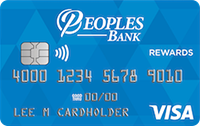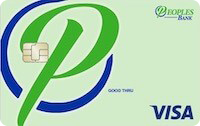Posted On: October 12, 2018 by Peoples Bank in: Cyber Security Financial Education

Every October since 2004, the United States has observed National Cybersecurity Month, which serves as a reminder to organizations and people around the nation of the threat cyberattacks pose.
At Peoples Bank, cybersecurity awareness is essential in everything we do. Along with keeping our customer’s personal information protected, we want everyone to use their technology safely and securely.
Here are three easy-to-implement measures you can take to improve your personal cybersecurity.
Update frequently and protect yourself
Everyone has to deal with notifications popping up on the bottom of screens reminding users to update and restart their device. It always seems to happen at the most inconvenient times, making it easy to push it off and promise to come back to it later.
Those updates are actually essential in the cybersecurity fight. They could be mitigating potential holes in your system. The well-publicized Equifax breach, which affected about 143 million Americans, happened because hackers exposed a known vulnerability in a web application. The fix for the problem was actually available two months before the breach but wasn’t installed.
Make sure to take the time to update your computer and programs with the latest patches and downloads because they could be mitigating a potential vulnerability. If you haven’t already, set your devices or applications to automatically update.
What goes hand-in-hand with software updates is anti-virus software, which can detect harmful downloads, files or activity on your device. Invest in quality anti-virus programs and ensure they are on constant alert.
So instead of procrastinating on downloading that update or pushing off that anti-virus sweep, take a few minutes, go for a walk and let your computer go to work.
Familiarity is your friend
Email phishing scams have been on the rise in recent years, and the skills of attackers have improved drastically. Scammers can now tailor information sent through email to entice users to download a file or click a link loaded with malware.
The same goes for faulty, unsecured websites, which can be used as covers to steal your personal information. This is especially important when shopping online and using sensitive payment information.
“Be aware of who you are talking to,” said Heather Craighton, operations manager and information officer at Peoples Bank. “Know what you’re looking at before you give anything out. If you have to share information, just make sure you know who’s on the other side of it.”
Strong passwords
We’ve touched on this one a few times over the past few months, but it can’t be said enough: A strong password can keep away attackers.
Make sure to use a mix of uppercase and lowercase letters with special characters, like !, #, $ or %. Having these types of passwords can be a pain to remember, but have a sticky note handy in a secure place to remind you in a time of need.




